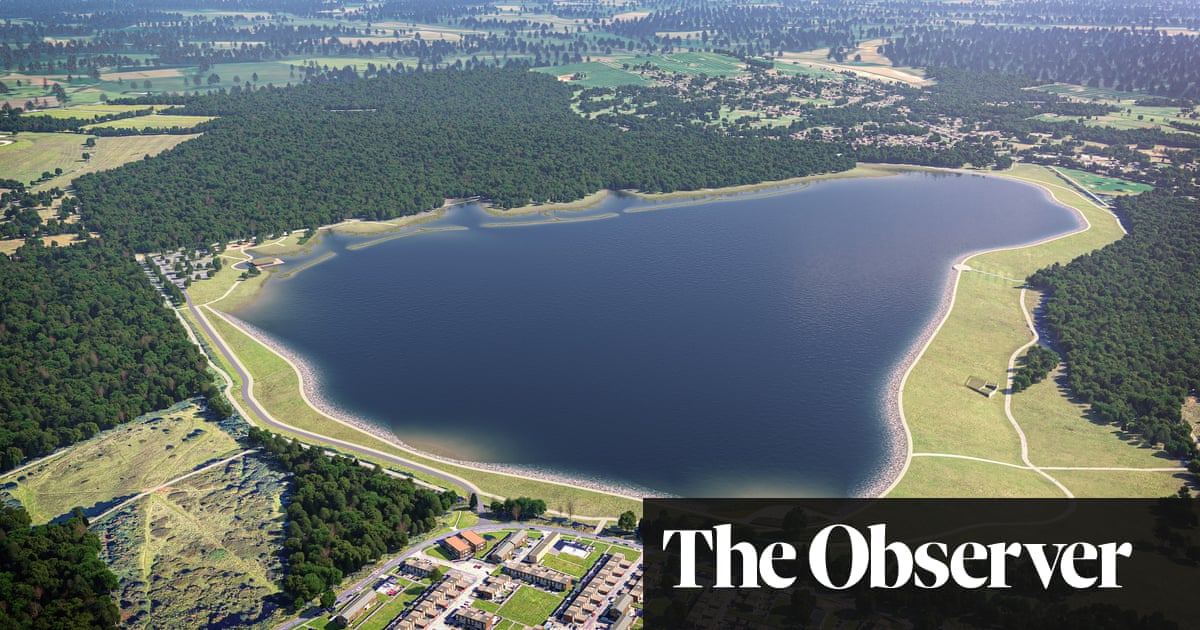A proposed £1.2bn scheme to recycle effluent from the sewage system and turn it in to drinking water has been criticised as a threat to the environment and a potential costly “white elephant”.
Southern Water wants to treat effluent – wastewater from the sewage system – at a plant at Havant in Hampshire and pipe it into a nearby spring-fed reservoir to boost water supplies during droughts. The scheme would ensure less water is extracted from two rare chalk streams: the Rivers Test and Itchen.
It would be the first reservoir in the country to use recycled water derived from effluent to supplement its levels. Regulators says effluent recycling is successfully used overseas, providing plentiful and safe supplies, but campaigners say there are more environmentally friendly options.
Southern Water has been fined tens of millions of pounds in recent years for polluting rivers and coastal waters in Kent, Sussex and Surrey with sewage. Last week, Ofwat, the regulator, announced a proposed annual bill rise for Southern Water customers of 44%, or £183, by 2030.
The company’s proposed Hampshire water recycling project would deliver up to 90m litres of drinking water a day and is proposed to be operational by 2034. Southern Water is due to submit an application for a development consent order next year and says the scheme will keep “the taps and rivers” flowing.
Tracey Viney, an environmental specialist advising campaigners opposing the project, said: “This is not a sustainable solution. We get plenty of rainwater and should be developing schemes to store water that can be used in dry summers.”
Bill Cutting, a former director of Southern Water in the 1990s, said he was opposed to the scheme. “The costs are horrendous,” he said. “It’s a good idea if you’re living in a country where there is no water, but you can’t say the UK has no water.”
The Havant Thicket reservoir is the first large-scale reservoir to be built in the UK for more than three decades and is a collaboration between Southern Water and Portsmouth Water. It was given planning permission in 2021 and will hold about 8.7bn litres of water.
Southern Water lost about 108.5m litres of water a day in 2022-23 through leaks, according to most recent figures. Campaigners say the company should focus on reducing and repairing leakage.
Residents were told the reservoir, which is under construction, would be fed during the winter by underground springs. It is now proposed it is topped up with recycled effluent purified at a plant which would be built on a former landfill site at Havant.
Once purified under an energy-intensive process called reverse osmosis, the water would be piped to the reservoir and mixed with spring water. The rejected contaminated water would be pumped into the sea through a long sea outfall.
The water from the reservoir will be pumped about 25 miles to a treatment works at Otterbourne in Hampshire, where it would undergo further treatment to strict drinking water standards.
Viney said the scheme was intended to alleviate drought conditions, but Southern Water would operate it year-round to ensure the systems and pipework remained in good condition.
It would purify and pump about 30m litres of water a day, even during wet weather, to maintain the infrastructure, equivalent to the water held by 12 Olympic-size swimming pools.
after newsletter promotion
Bob Comlay, who runs the Havant Matters website, which details community concerns, and who is also vice-chair of the Solent Protection Society, said construction work to build the plant on the former landfill site risked contaminating groundwater which would flow into the Solent. There are also concerns about the environmental impact on the marine ecology of rejected contaminated water discharged into the sea.
He said a Thames Water desalination plant which used the same technology had been mostly inactive since it was opened. “This is a vanity project,” he said. “It will be a white elephant.”
Tim McMahon, water director at Southern Water, said urgent action was required to provide increasing demand for water and to protect Hampshire’s chalk streams. Earlier this year, Southern Water admitted to discharging sewage into the River Test, a chalk stream famous for its trout fishing.
McMahon said: “More than 2.5bn extra litres of water a day will be needed in our region by 2050. [This project] will create a new safe and dependable source of supply that will help keep taps and rivers flowing.”
Southern Water says the impact of releasing reject water into the Solent is being investigated as part of its environmental impact assessment. It says the site of the proposed new plant at Havent will have “sustainable drainage features”.
Bob Taylor, chief executive of Portsmouth Water, said the firm was “consistently open and upfront” during the planning process about the potential supply for the reservoir of recycled water. He said Portsmouth Water was “proud to be building the first major new UK reservoir in over 30 years”.
Paul Hickey, managing director of the Regulators’ Alliance for Progressing Infrastructure Development, said: “We have allocated Southern Water £71m to further progress the development of the Hampshire water transfer and water recycling project.
“Water recycling is a safe, established method of water treatment. The technology is well tested elsewhere in the world. The scheme will need to go through a rigorous process before securing planning consent.”
Source link
